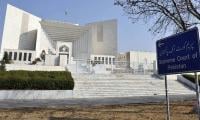LAHORE:In his conversation with Akbar Zaidi, former finance minister Miftah Ismail said that it's too bad we're busy thinking about the future of Pakistan Tehrik-e-Insaf (PTI) or Pakistan Mulslim League Nawaz (PMLN), but not the future of Pakistan.
Speaking of the burden on the taxpayer, he stated the need for the tax net to be broadened, because non-tax paying individuals are free riding on the national treasury.
Speaking of the structural issues in Pakistan, he mentioned that a huge majority of the children in Pakistan are malnourished and are out-of-school. “The governance system in Pakistan is the least effective system in place, which is why it is unable to provide for the common person and is only catering to the luxuries of the elite,” he said.
Miftah Ismail turned the attention towards the education system in Pakistan, quoting the structural dynamics of Pakistan. “The elite of Pakistan, opting for high street schooling have a better chance of getting slot in the few good universities that we have in Pakistan, the middle class of Pakistan gets unrepresented in this regard too,” he said.
The novel idea of Death Tax, which was tossed by Miftah Ismail during his ministry, was also shared. According to this, the wealth of the deceased person had to be taxed before being handed over to the heirs.
Political conflict: In 75 years, those affected most by political conflict in Pakistan are the middle class. Elite groups create the conflicts and enjoy the consequences of the conflicts. This was observed by Dr Muhammad Waseem of LUMS in conversation with Raza Rumi of Naya Daur on the Day 2 of ThinkFest here at Alhamra, The Mall.
Dr Waseem said, “Conflict between meritocracy and democracy is causing political conflicts. Elected political class, middle class, ideological people (tribe, jirga system) can reduce the conflicts. Ideological model (narratives against corruption, using religious card) helps to influence the middle class; therefore, whoever uses these models will become important in the society.
“Nationalism is a threat to democracy. Earlier, it was Bengali nationalism, now there is Punjabi, Pashto, Balochi, Seraiki nationalism,” he said. There were 21 sessions in all on Day 2 of Thinkfest. They were on ‘50 years of the Pakistan Constitution’, ‘New Media: Democratisation vs Disinformation’, ‘Are politicians the real problem of Pakistan?’, ‘Is populism the future of democracy?’, ‘From Nehru to Modi: A new India’, ‘Are Local Governments the answer to Pakistan’s crises?’, ‘Technology and elections’, ‘Tapestry: Strands of women’s struggles woven into the history of Pakistan’ among others. There were sessions on film, TV and fashion as well.
Representational image of inmates sitting inside a jail. — AFP FileLAHORE: A gang involved in conducting five shop...
ICT Police Khidmat Markaz. — Facebook/Police Khidmat Markaz & Driving License F-6 Islamabad LAHORE:As many as...
Punjab University in Lahore. —APP/FileLAHORE: Punjab University and Psychological Research Wing of Pakistan Army...
Punjab University’s Confucius Institute organised the 23rd ‘Chinese Bridge Competition’ on May 3, 2024. —...
A group photo of the National Institute of Management officers along with the officers of the Punjab Safe Cities...
Tanzeem-e-Islami ameer Shujauddin Shaikh . — Facebook/Shuja Uddin SheikhLAHORE: Tanzeem-e-Islami ameer Shujauddin...







